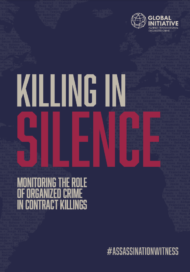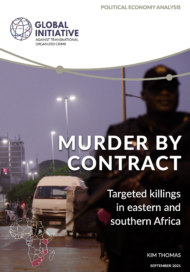Event Details
Where
Virtual event
Posted on 17 Nov 2021
Click here to access the digital tool> assassination.globalinitiative.net
In 2019 and 2020, at least 2 700 people in 84 countries were the targets of contract killings linked to organized crime, according to the Global Initiative Against Transnational Organized Crime (GI-TOC)’s latest research. The GI-TOC’s Global Assassination Monitor records contract killings around the world in the hope of contributing to a better understanding of the dynamics behind such assassinations, inform better policy responses and help victims seek justice.
In July 2021, the assassination of Haitian president Jovenel Moïse made headlines. The media reported that a large number of foreign nationals had been involved in the murder, including 13 suspected Colombian contract killers, but the identity of those who ordered the killing remains unknown and is still the subject of investigation. Although the case received widespread international coverage, employing hitmen to carry out the assassination of prominent figures is not a new phenomenon. All over the world, thousands of people are assassinated yearly, in silence. In many countries, assassinations have become a daily occurrence.
Assassinations, or contract killings, are frequently used by criminal networks to achieve their political, economic and criminal interests. They enable criminal actors to maintain control over communities, allowing them to take over lucrative markets or infiltrate public institutions. They are also a way of silencing those who take a stand and threaten to challenge the status quo, or those who investigate and dismantle criminal activities. The negative impacts of this crime are severe, weakening society and the economy, and undermining democratic processes. Despite the harm they cause, assassinations are an understudied topic, and in particular how they link to organized crime.
The GI-TOC has developed a unique and novel database on contract killings worldwide. The Global Assassination Monitor, a disaggregated data-collection project that is part of the GI-TOC’s Assassination Witness initiative, records hits and attempted hits. (To be classified as contract killings, the murders need to meet two criteria: they target specific individuals and they involve some form of contract, with the perpetrators receiving a reward for the killing.) The database draws on extensive research of international and national media sources, and the results of this analysis will be presented in the forthcoming report ‘Killing in silence: Monitoring the role of organized crime in contract killings’.
The data indicates that assassinations are highly clustered in several ways. They are clustered geographically, with high concentrations in the Americas (accounting for 37% of all recorded cases) closely followed by Asia (which accounted for 33%). Africa accounted for 24% of cases while Europe accounted for only 6%. The data suggests that contract killings tend to flourish in environments where there is a strong presence of organized crime, power struggles, corruption and violence. Assassinations are also found to be deployed to target certain groups, especially activists, community leaders and politicians. And they cluster around specific motives or drivers, often related to political or economic interests. The findings point to the strength of the criminal groups who order these contract killings, and the way in which organized crime is often embedded in political and economic institutions.
Despite the COVID-19 pandemic, with its restrictive measures in the form of lockdowns and border closures, contract killings continued unabated in 2020. In fact, the measures taken to contain the virus would appear to have created opportunities for assassinations to increase, at least in some areas. The findings highlighted in this research not only uncover the sheer magnitude of global organized-crime-related assassinations, but also help understand how this criminal phenomenon gravely impacts the social fabric of communities the world over.
This initiative provides a first stepping stone in highlighting areas for further research and better responses to this crime, such as investigating links between the illicit firearms trade and how it relates to assassinations, strengthening investigatory and adjudicatory capacities, bolstering corporate responsibility, engaging with civil society and providing protection for activists.
Following the 2020 flagship publication Faces of Assassination: Bearing Witness to the Victims of Organized Crime, the GI-TOC will launch the Global Assassination Monitor and its accompanying report, ‘Killing in silence: Monitoring the role of organized crime in contract killings’, on 17 November 2021.
Read more about our #AssassinationWitness campaign and sign-up to the Assassination Newsletter to get regular updates on the launch event.





